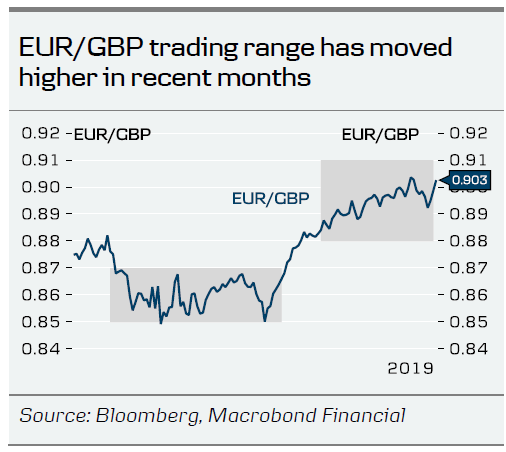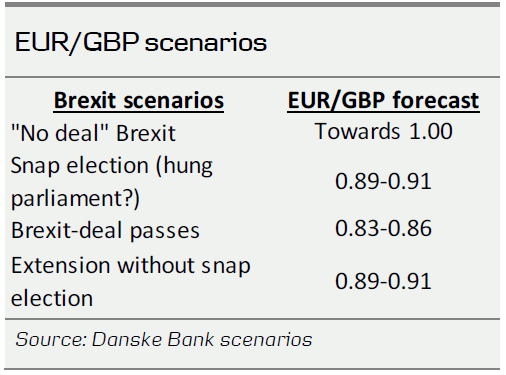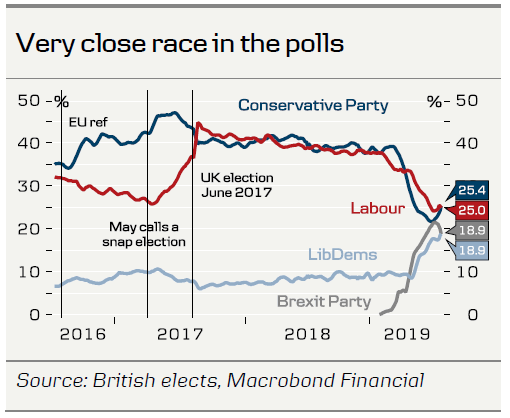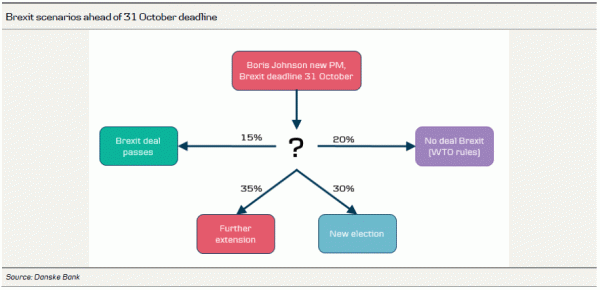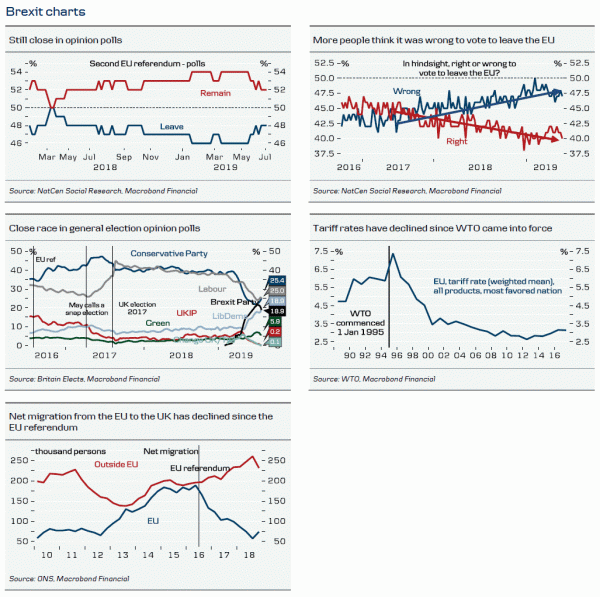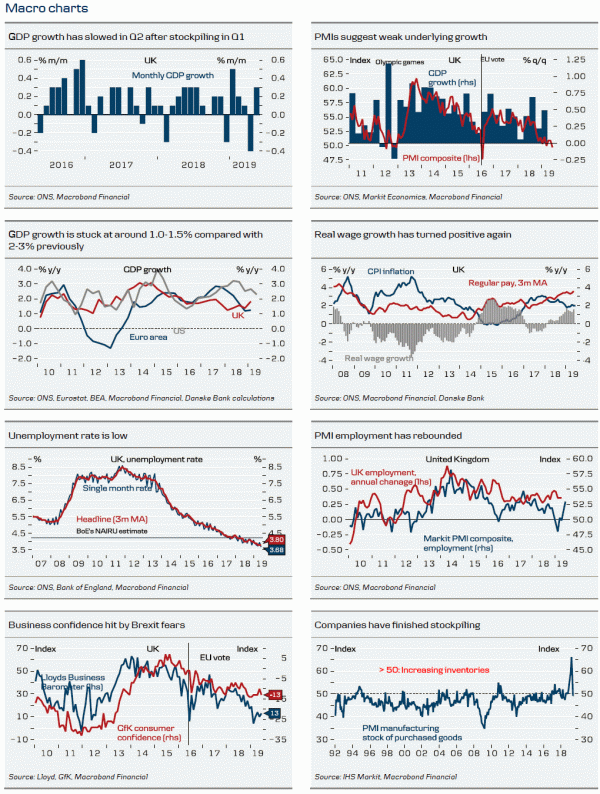Key takeaways
- While Boris is more pro-Brexit than Theresa May, the arithmetic in the House of Commons does not change. It will be difficult to force a no-deal Brexit through.
- Our base case is a further extension but it is not a high conviction call. We need to monitor whether and if the dynamics in British politics change. The uncertainty is whether there will be snap election.
- The range of possible outcomes is likely to be 0.86 (if Brexit-related news improves markedly) to 0.91 (against expectation but if we see much weaker data and/or by pricing a higher probability of no-deal Brexit.
Boris Johnson cannot change the arithmetic in the House
After a long Conservative party leadership contest, we now know a little more about what to expect of British politics, although it remains highly unpredictable. Surprisingly, new Prime Minister Boris Johnson has chosen to surround himself with mostly Brexiteers from the official Vote Leave campaign, choosing these for top positions in the Cabinet and staff. Many of the most prominent members of May’s Cabinet have been sacked or resigned. We thought Johnson would have appointed more moderate/pragmatic Conservatives. For the first time, the Conservative Brexiteers are in charge of Brexit, while the moderate Conservatives are sitting on the backbench. The problem for Boris Johnson is that he cannot change the arithmetic in the House, which remains divided on Brexit. It may not be as easy for him to leave the EU on 31 October without ‘ifs and buts’, as he argues there is always a but.
While Boris Johnson says he wants a deal with the EU (but without the backstop), he is accelerating the preparations for a no-deal Brexit. Some have labelled this the ‘twin strategy’, as the government puts equal weight on securing a deal and getting ready for no deal. This may turn out to be part of the negotiation strategy but Johnson’s room for compromise appears little, as he says, for example, a time-limited backstop is still unacceptable. Number 10 Downing Street has said it is ready to negotiate but it needs to be based on removing the backstop from the Withdrawal Agreement. The EU 27 has already rejected this.
With the UK politicians on summer holiday, we believe things are likely to calm down for now, as Boris Johnson settles into his new job. We are heading for a dramatic autumn, with the Conservative party conference beginning on 29 September, an EU summit on 17-18 October and the new Brexit day on 31 October.
In the following, we discuss four likely cases for what may happen before 31 October. Our updated game tree is on page 3.
The range of possible outcomes is likely to be 0.86 (if Brexit-related news improves markedly) to 0.91 (against expectations but if we see much weaker data and/or by pricing a higher probability of no-deal Brexit). We keep the forecast for the central scenario at EUR/GBP at 0.90 over a full 12-month horizon. Towards year-end, the risk appears slightly skewed towards GBP strength and peak volatility, in our view.
Case 1: No deal Brexit – complicated as it lacks support in the House of Commons (20%)
One possible scenario is that we are heading for a no-deal Brexit. Both Prime Minister Johnson and the EU 27 are unwilling to compromise, making it difficult for the two sides to reach an agreement and the UK is forced to leave the EU without a deal.
The uncertainty is how credible Johnson’s ‘do or die’ threat really is. His working majority (including the votes from the supporting party DUP) is currently two and is likely to be just one after a by-election on 1 August. Prominent members of the moderate Conservative backbenchers have hinted they are willing to bring down their own government if necessary to prevent a no-deal Brexit. The Conservative backbenchers can also make life more difficult for Boris Johnson by voting against necessary no-deal Brexit legislation. It is not credible to crash out of the EU by ‘accident’, as it would be very disruptive due to the legislative vacuum it would create.
In reality, we have a more pro-Brexit government but it inherits the same problems Theresa May’s previous government faced with a divided Parliament. A no-deal Brexit would require Johnson to be better at twisting the Conservative MPs’ arms than PM Theresa May.
The EU 27 also has the problem that it does not have many answers to the question of how to avoid a hard border in Ireland.
Case 2: General election – makes sense except the Conservatives risk losing power (30%)
Many UK political analysts think the most likely outcome is snap election in the autumn and think Johnson’s appointments to Cabinet and staff point in this direction. That Johnson is on his way to visit many regions of the UK and has made many promises on domestic topics suggests this to us too.
However, a general election would be a big gamble for Boris Johnson and there is a clear risk that Johnson would become the shortest serving Prime Minister in the UK’s history. Looking at the opinion polls, the two old parties – Conservative Party and Labour Party – are under pressure from The Brexit Party and Liberal Democrats and all four parties are polling around 20% (plus/minus), although some fresh polls indicate increasing support for the Conservatives since Johnson became leader. Still, at the time of writing, it seems likely the result would be a hung parliament (i.e. no absolute majority to any party), making it even more difficult to resolve Brexit. However, this gamble may succeed if Boris Johnson is able to get more voters back from The Brexit Party while Labour is still losing votes to the Liberal Democrats. In this case, the Conservative Party may actually increase its majority, given the UK’s single-member constituencies electoral system (‘winner takes all’).
A general election would require an extension of the current 31 October deadline, which we think the EU 27 would grant.
Case 3: Deal Brexit – difficult to reach an agreement (15%)
Assuming the harsh tones from both the UK and EU 27 are only part of the negotiating process, it may still be possible for the two sides to reach a new agreement if both are willing to compromise and climb down from the tree. One solution may be to make an even longer transition period to give more time to find a long-lasting solution to the border issue.
Given his popularity, we believe Johnson has more chance of getting a deal through Parliament than ex-Prime Minister Theresa May. The risk for the Brexiteers of failing to deliver is that it increases the probability of a reversal of Brexit due to demographic changes (young voters are pro-EU, older voters are pro-Brexit).
Case 4: Extension without snap election (35%)
It is also possible we will see another extension (probably at least another six months but perhaps even longer) without a snap election. The two sides are having difficulties finding a common way forward but also know that a disorderly exit would have damaging effects both economically and politically. Johnson knows it is difficult for him to force a no-deal Brexit through Parliament and at the same time he probably knows it is far from certain he would win a general election and that he risks moving out of 10 Downing Street before he really gets started. It would not be the first time in the history of politics that a politician has promised to deliver something before a specific date and then missed the deadline.
In our view, the EU system is world champion at kicking the can down the road and while the EU leaders are sick and tired of Brexit, there are advantages to keeping the UK within the EU (e.g. the UK keeps paying into the EU budget). In addition, the EU does not want to take the blame for kicking the UK out. As mentioned earlier, the demographic development means that a Brexit reversal is becoming more likely as time goes on.
From an economic point of view, another extension is not only for the better. Yes, the UK would remain in the single market but it would extend the period of high uncertainty. It is very striking that business investments in the UK are lower than a year ago now that the recovery is nearly 10 years old.
Brexit remains key driver for GBP
The range of possible outcomes is likely to be 0.86 (if Brexit-related news improves markedly) to 0.91 (against expectation but if we see much weaker data and/or by pricing a higher probability of no-deal Brexit). We keep the forecast for the central scenario to be EUR/GBP at 0.90 over a full 12-month horizon. Towards year-end, the risk appears slightly skewed towards GBP strength and peak volatility, in our view.
In our base case where we get another extension, we expect EUR/GBP to continue trading in the current range. This is also the case for a snap election, when the prospect of a hung parliament is probably not much different from what we are witnessing currently. We remain very negative on GBP in the case of a no-deal Brexit, when we still see EUR/GBP moving towards parity.
In the even we get an orderly Brexit (one way or another), we expect EUR/GBP to move lower, probably down to the 0.83-0.86 range.

